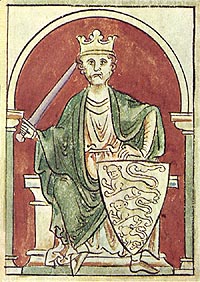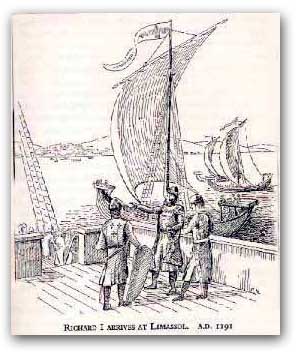
Cyprus
under Richard I
To understand the
events which ended the tyranny of Isaac Commenus in Cyprus, it
is necessary to return to the history of the kingdom of
Jerusalem. The success of the First Crusade had been largely due
to disunion between the Moslems of Asia and of Egypt, but in
1171 Saladdin made himself the supreme ruler of Islam in the
East and prepared jihad or holy war for the recovery of
Jerusalem from the crusaders.

Richard I
The marriage of
Sybilla, heiress to the kingdom of Jerusalem, to the French
adventurer Guy de Lusignan caused dissension among the
crusaders. For Guy was hated by powerful rivals for the crown
and, when he came to the throne in 1186, he was unable to
exercise any real control over his kingdom. The tide had turned,
and Saladdin at last delivered his attack with united forces and
with a spirit equal to that which had fired the Christians of
the First Crusade, for to the Moslems also Jerusalem was a holy
place.
In 1187, on the
sandy plains of Hittin under a scorching July sun, the army of
Guy de Lusignan was utterly defeated and, after a fortnights
siege, Jerusalem was taken. Of the kingdom itself nothing was
left except the city of Tyre, together with the principalities
of Antioch and Tripoli in the north. The fall of Jerusalem sent
a shock throughout Christendom. The three great monarchies of
Europe at that time, England, France, and Germany, sinking their
political rivalries for the common aim, collected revenues and
armies for the Third Crusade.
The Third
Crusade
To recover
Jerusalem, the first aim was to establish a base of operations
on the coast of Palestine, and for this reason the object of the
Third Crusade was the capture of Acre. The siege of Acre, one of
the great sieges of history, had been begun in 1189 by Guy de
Lusignan who, captured by Saladdin at the battle of Hittin and
released on parole, had at once broken his word and returned to
the attack. The Germans marched overland to Acre. Philip, king
of France, and Richard Coeur de Lion, of England, agreed to take
the sea route to the Holy Land together, and in 1191 they left
Sicily, where they had wintered.
 While Philip
sailed straight for Acre, the fleet of Richard was scattered by
a storm and took refuge in Crete and Rhodes. Three of his ships
were driven to the shores of Cyprus, where they were wrecked and
sank in sight of the port of Limassol. hose of the crews who
escaped to land were taken prisoners by the order of Isaac
Commenus and their property confiscated. Another English ship
reached the harbour having on board Johanna, the Queen Dowager
of Sicily, sister to Richard, and his affianced bride,
Berengaria of Navvare.
While Philip
sailed straight for Acre, the fleet of Richard was scattered by
a storm and took refuge in Crete and Rhodes. Three of his ships
were driven to the shores of Cyprus, where they were wrecked and
sank in sight of the port of Limassol. hose of the crews who
escaped to land were taken prisoners by the order of Isaac
Commenus and their property confiscated. Another English ship
reached the harbour having on board Johanna, the Queen Dowager
of Sicily, sister to Richard, and his affianced bride,
Berengaria of Navvare.
Isaac was
attempting by cajolery and then by threats to induce the
princesses to land, when Richard with the rest of his fleet
reached the port of Limassol. Hearing of the outrages which had
been inflicted upon his shipwrecked subjects and the insults
offered to his sister and to his affianced bride, he instantly
demanded satisfaction. Isaac, who had assembled his forces to
repel the English, answered these demands with threats. Richard
immediately determined to give battle. Beside the natural desire
to avenge his wrongs, the island of Cyprus offered a convenient
base for the operations in Palestine and a source of men,
treasure, and timber for the prosecution of the campaign.
Moreover, it was reported that Isaac, having rebelled against
his emperor, was secretly in league with Saladdin.
Richard
Conquers Cyprus
 Richard
thereupon landed his followers in boats, and at the head of his
men, attacked the Cypriots on the shore. The islanders were
ill-equipped and no match for the English archers and armoured
knights, who defeated them with great slaughter. The fall of
night enabled Isaac to withdraw the remnants of his forces to
the hills, where they encamped five miles from Limassol. Richard
attacked their camp before dawn, and taken by surprise, Isaac
barely escaped with a few men. The next day many of the Cypriot
nobles came to the king of England and gave him their
allegiance. Three days later Guy de Lusignan, king of Jerusalem,
and many of his counts came to meet Richard in Cyprus, and swore
fealty to him. Isaac, seeing that his people were deserting him,
sent an embassy to Richard offering to pay 20,000 marks of gold,
to send 500 men- at-arms to take part in the crusade, and to
surrender his daughter and his castles as a pledge for his good
behaviour. These conditions being accepted, Isaac came to
Limassol and swore solemn allegiance to the king of England, but
the same night, fearing treachery, he made his escape and
denounced the treaty. Richard then placed a large force under
the command of Guy de Lusignan with orders to pursue and capture
Isaac, while he himself with his ships sailed round the island
seizing all the towns and ports on the coast. But Isaac managed
to escape to the stronghold of Kantara.
Richard
thereupon landed his followers in boats, and at the head of his
men, attacked the Cypriots on the shore. The islanders were
ill-equipped and no match for the English archers and armoured
knights, who defeated them with great slaughter. The fall of
night enabled Isaac to withdraw the remnants of his forces to
the hills, where they encamped five miles from Limassol. Richard
attacked their camp before dawn, and taken by surprise, Isaac
barely escaped with a few men. The next day many of the Cypriot
nobles came to the king of England and gave him their
allegiance. Three days later Guy de Lusignan, king of Jerusalem,
and many of his counts came to meet Richard in Cyprus, and swore
fealty to him. Isaac, seeing that his people were deserting him,
sent an embassy to Richard offering to pay 20,000 marks of gold,
to send 500 men- at-arms to take part in the crusade, and to
surrender his daughter and his castles as a pledge for his good
behaviour. These conditions being accepted, Isaac came to
Limassol and swore solemn allegiance to the king of England, but
the same night, fearing treachery, he made his escape and
denounced the treaty. Richard then placed a large force under
the command of Guy de Lusignan with orders to pursue and capture
Isaac, while he himself with his ships sailed round the island
seizing all the towns and ports on the coast. But Isaac managed
to escape to the stronghold of Kantara.
On 12 May,
1191, Richard, king of England, was married at Limassol to
Berengaria, daughter of the king of Navvare, and on the same day
Berengaria was crowned queen of England by John, bishop of
Evereux. After this, hearing that the daughter of Isaac had
taken refuge in Kyrenia, Richard went there with his army and
received her submission. She was entrusted to the care of
Berengaria, and some ten years later married a French knight, a
relative of Baldwin, count of Flanders. Isaac, who had fled to
the Karpass in the hope of escaping by boat to the mainland, was
at last taken prisoner in the abbey of Cape St. Andrea at the
eastern point of the island. He was bound in fetters of silver
and imprisoned in the castle of Markappos in Syria, where he
died soon after in captivity.
Revolt of
the Cypriots
Richard, with
much treasure taken from Isaac, then set sail for Acre,
accompanied by the king of Jerusalem, the prince of Antioch, the
count of Tripoli, and the nobles who had joined him in Cyprus.
Garrisons were placed in the towns and castles of Cyprus, and
the island was left in charge of Richard of Camville and Robert
of Tornham.
The conquest of
Cyprus by Richard had far-reaching results. It was the first
step in the subjection of the eastern empire to the crusades,
which was to be followed fifteen years later by the capture of
Constantinople itself by the crusaders and the division of the
empire into feudal fiefs. For Cyprus, it was the beginning of a
domination by western powers for nearly 400 years and the
introduction of the feudal system of Normans and of the Latin
Church into an island which hitherto been Orthodox in its faith.
The Cypriots,
on the departure of the English king, began to realise that
their ancient freedom was in danger and resolved to attempt to
regain their independence. They proclaimed as emperor of Cyprus
a monk who was said to be a relative of Isaac Commenus, and
raised the standard of revolt. But, Robert of Tornham, the
king’s lieutenant, was aware of the projected rising and made
a sudden attack on the insurgents before their plans were
matured. The Cypriots were defeated and their leader was taken
and hanged. The news of this revolt caused Richard to regard the
possession of Cyprus as a doubtful gain. He could not spare the
troops for holding the island by force, nor was it of any use as
a base unless it were securely held. Being greatly in need of
money for carrying on the campaign in Palestine, he therefore
sold the island to the Templars for the sum of 100,000 bezants,
of which 40,000 were to be paid at once and the remainder by
instalments.
Related Links
References
-
From:
Newman, P., (1940), "A Short History of Cyprus",
Longmans, Green & Co., London.
